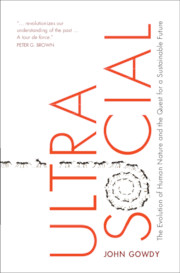Book contents
- Ultrasocial
- Reviews
- Ultrasocial
- Copyright page
- Dedication
- Contents
- Figures
- Tables
- Preface
- Acknowledgments
- Part I The Evolution of Human Ultrasociality
- 1 The Ultrasocial Origin of Our Existential Crisis
- 2 The Evolution of Ultrasociality in Humans and Social Insects
- 3 Our Hunter-Gatherer Heritage and the Evolution of Human Nature
- 4 The Agricultural Transition and How It Changed Our Species
- Part II The Rise and Consolidation of State/Market Societies
- Part III Back to the Future
- Notes
- References
- Index
4 - The Agricultural Transition and How It Changed Our Species
from Part I - The Evolution of Human Ultrasociality
Published online by Cambridge University Press: 09 October 2021
- Ultrasocial
- Reviews
- Ultrasocial
- Copyright page
- Dedication
- Contents
- Figures
- Tables
- Preface
- Acknowledgments
- Part I The Evolution of Human Ultrasociality
- 1 The Ultrasocial Origin of Our Existential Crisis
- 2 The Evolution of Ultrasociality in Humans and Social Insects
- 3 Our Hunter-Gatherer Heritage and the Evolution of Human Nature
- 4 The Agricultural Transition and How It Changed Our Species
- Part II The Rise and Consolidation of State/Market Societies
- Part III Back to the Future
- Notes
- References
- Index
Summary
Some 10,000 years ago, agriculture arose independently in several areas across the world. The causes of the agricultural transition are still debated, but it is likely that the unprecedented warmth and stability of the Holocene climate made agriculture possible and that the climate instability of the Pleistocene made it impossible. As the weather became more predictable, people began to more intensively manage wild plants and began to store the grain they collected. Because of the unpredictability of harvests, people cultivated more crops than they thought they would need, and in most years, there was a surplus of food, leading to larger and more concentrated populations. By 5,000 years ago, small-scale agriculture had led to large-scale state-managed economies and total dependence on agriculture. Competition between city-states gave us full-blown ultrasocial economies and hierarchical, repressive states. Other consequences of agriculture for individuals include a marked decline in physical health, a reduction in brain size, and a loss of individual autonomy.
- Type
- Chapter
- Information
- UltrasocialThe Evolution of Human Nature and the Quest for a Sustainable Future, pp. 64 - 86Publisher: Cambridge University PressPrint publication year: 2021

